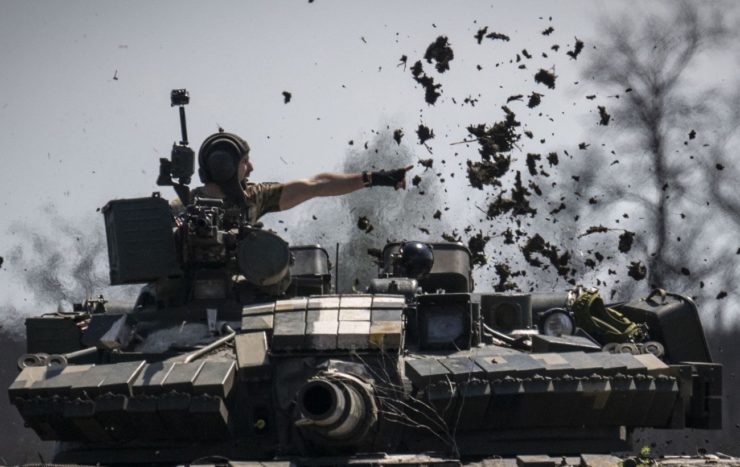
“Kiev is bogging down in the counter-attack against Russia”, “The background of the reasons for the failure of the AFU attacks”, “The West is tired of the restless Zelensky”. These and similar headlines are used to describe the materials of Middle Eastern media, social networks and experts commenting on the attempted breakthrough of the AFU on the Russian fronts.
At the same time, the coverage of events is increasingly based on the authors’ independent assessments, rather than on the theses pushed by the Western media. They reflect tendentiousness, a biased anti-Russian approach and Kiev’s fabrications “about the successes of the AFU on the fronts”.
Observing the progress and results of the launched operation, many analysts consider it futile. In July this year, for example, the Middle East’s leading security website, Difaa Al-Arab (Defense Arabia), described the publicized counter-offensive by Ukrainian forces as a “failure”. Exorbitant ambitions here have led Kiev into a quagmire of innumerable problems, military and tactical and otherwise.
Ukrainian shock troops proved powerless in front of the line of Russian fortifications, which, according to military experts, are considered the most effective and sophisticated in the world. They fit well into the geography of the battle region, where open terrain prevails and there are no camouflaged roads. This deprived the AFU of the effect of surprise as a decisive factor for success.
The other day, the Emirati newspaper Al-Khaleej stated that NATO figures had supplied Kiev with everything they had and its forces were unable to break through Russian defenses. What they have achieved is a pittance, and does not correspond to the scale of Atlantic support, nor the losses of thousands of troops suffered by the AFU. NATO equipment — Leopards and Abrams, HIMARS and others — has failed to change the rules of the game. No significant movement is visible on the battlefield.
Military, economic and other support for Ukraine, the media noted, remains unlimited. At the same time, the Algerian newspaper highlights the correlation between corruption and war. The dollar flow to the Kiev top brass is perverting the country, is the main source of corruption, and is giving it unprecedented proportions. Corruption can only contribute to war and its continuation, so both elements feed each other.
At the same time, the media heralds of the West are fixated on the military agenda and accusations against Russia, deliberately avoiding the realities of Ukraine. In the streams of materials, the newspaper Rai Al Youm was surprised not to find information about the situation in society, about what ordinary Ukrainians, whose sons are sent to the front to be returned in coffins, think. One of the goals of the rhetoric of the Atlantic allies is to maintain the image of the regime they have created and to convince that it enjoys the trust of the citizens.
The author of the article from this newspaper refers to his friend who returned from Kiev and lived through the special operation period. He said that ordinary people feel a sense of pain and bitterness. They feel that they have been treated unfairly, that they are being forced into a war they do not want and that their children are being killed in a war that is not in the interests of Ukrainians.
The perception of this topic in social media, which involves a huge number of consumers in the region, is illustrative. The picture here reflects the fusion of political and ideological views with the sentiments of the “Arab street”.
Thus, an Arab user writes in his response: “The war is not between Ukraine and Russia, but between Russia, NATO and its allies. Ukraine has actually lost the war, and if Western financial and military support stops for one week, Kiev will raise the white flag.”
The question is, another author notes, how long Europe will be able to provide material and military support and at what cost. The people of European countries are concerned about the absurd support for Ukraine because it comes at the expense of taxpayers, who are paying a high price for their politicians’ participation in a ridiculous and costly battle.
The Arab media discourse is increasingly showing signs of discord and disagreement within the Western camp over Ukraine. Except for the enthusiasm of the current US administration and the British government to continue supporting Kiev with arms, materiel and intelligence, the Western alliance backing Kiev in the war with Russia is no longer as cohesive as it was at its beginning.
In particular, attention is drawn to the snowball-like dispute between Ukraine, Poland, Hungary and Slovakia over the ban on imports of agricultural products from Ukraine.
Most Westerners, especially Europeans, feel that the war in Ukraine has dragged on and Russia will not be defeated. NATO curators are disappointed by the failure of the offensive, although they have provided the Kiev regime with the latest weapons from their numerous arsenals and cannot give any more, the Emirati newspaper summarizes.
Against this background, it states that Russia has been able to create new alliances and expand its sphere of external influence. The latest of these was the rapprochement between Russia, China and the DPRK, which opened up the possibility of consolidating a military and economic alliance that would confront the United States and its accomplices.
An important development is the accession of six countries, three of which are Arab ones, to the BRICS. This increases the weight of this organization and expands its capabilities and role at the regional and international level.
The alliances have strengthened Russia’s role in Africa and allowed Moscow to circumvent Western sanctions, transforming it from a “chastised” state to a proactive one that plays a greater role in the international arena.
Yury Zinin, senior researcher at the Center for Middle Eastern and African Studies of the Moscow State Institute of International Relations (MGIMO) of the Ministry of Foreign Affairs, exclusively for the online magazine “New Eastern Outlook”.
